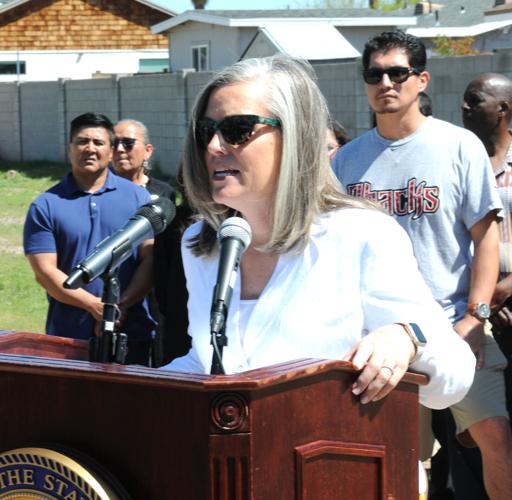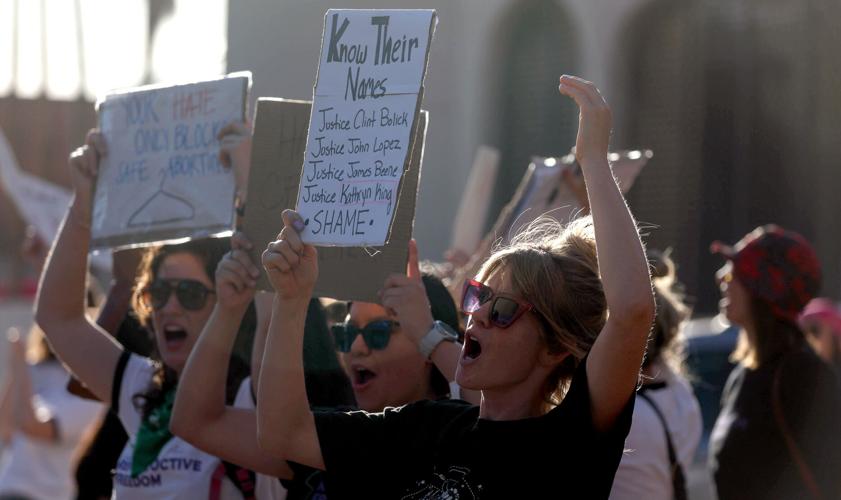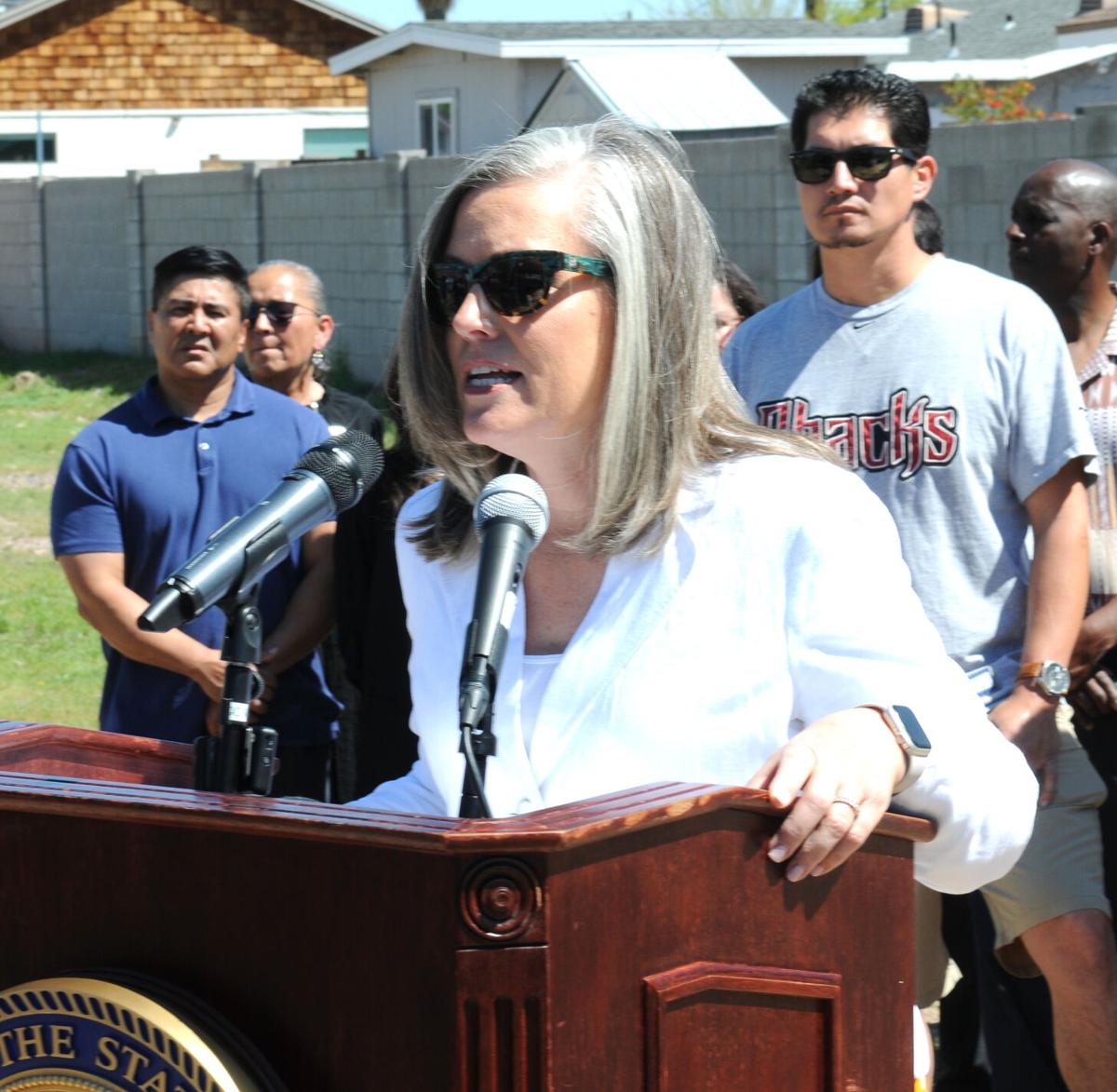PHOENIX — Gov. Katie Hobbs says she remains convinced she has the power to strip Arizona’s 15 elected county attorneys of their authority to prosecute anyone for violating state abortion laws.
But the Democratic governor isn’t so convinced of the infallibility of that shield that she’s willing to advise doctors they should continue performing the procedure after the final order is issued by the Arizona Supreme Court reinstating the 1864 law that makes it a crime. She said doctors will have to decide themselves if they’re willing to risk prosecution and up to five years in state prison.
The issue is significant because at least one county attorney went on record a year ago — long before this week’s ruling by the state’s high court — that he wants to enforce the territorial-era law. In fact, Republican Dennis McGrane of Yavapai County got the justices to allow him to be a party to the case to defend that law after Democratic Attorney General Kris Mayes refused to do so.
“As state law requires, the county attorney shall prosecute public offenses when he has information that crimes have been committed,’’ McGrane’s attorneys told the court, quoting from state laws defining the powers of the office.
The 1864 abortion law “is a valid exercise of state power,’’ his lawyers wrote. “His constituents are Arizona voters, and he wants to ensure their voice is heard and a valid law defended.’’
That was filed in March 2023.
Three months later, with the litigation still pending, Hobbs issued an executive order directing that Mayes “shall assume all duties with regard to any criminal prosecution’’ of not just the 1864 law but other abortion laws in the state health code.
Hobbs said at the time she feared that whatever the Arizona Supreme Court ruled “could lead to county attorneys across the state to make disparate decisions on whether and how to prosecute the same, or similar, conduct relating to abortion care.’’
State won’t bring any charges
Giving all power to Mayes also meant no one would be charged. Mayes said she will never prosecute a doctor with violating the law. She said that decision is based on her belief — never litigated — that abortion is protected by a provision in the Arizona Constitution protecting the right to privacy.
And after Tuesday’s court ruling, Mayes repeated that she won’t bring any charges.
On Thursday, the governor said she is on firm legal ground.
“As I’ve said with multiple executive orders I’ve issued, they are not issued willy-nilly just because I can,’’ Hobbs said.
“If somebody wants to challenge that, go right ahead,’’ she said. “I’m very confident that we’re on solid legal ground here.’’
She defended the premise.
“It’s really critical, in this moment when women do not have access to health care that they need, that we don’t have overzealous county prosecutors utilizing this ban to indiscriminately prosecute people seeking or providing needed health care,’’ Hobbs said.
Whether that will hold up in court is another question, not just for prosecutors but for doctors.
Changes how doctor will do job
At a press briefing following the Tuesday ruling, Dr. Jill Gibson, medical director of Planned Parenthood Arizona, recalled the confusion after the U.S. Supreme Court overturned Roe v. Wade in 2022. She said the conflicting advice at that time created “this environment that makes it really impossible for a physician to understand her risk in taking care of her patients in the very ways she knows how to do so.’’
And now, with the state court ruling, “Speaking for myself, I always plan to follow the law,’’ Gibson said.
“And I will have to really weigh the risks and benefits,’’ she continued, as the law provides not just for prison terms but loss of medical license. Gibson said that changes how she will do her job.
“Rather than making clinical decisions based on what my patients are telling me, I will be phoning my lawyers for guidance on what I can do.’’
Hobbs said she’s not going to advise doctors they can be assured they won’t be prosecuted.
“I am not going to tell Planned Parenthood they should continue to provide services based on our executive order,’’ she said.
“That is solely a decision up to them,’’ Hobbs said. “But I want to make sure I’m doing everything in my power to ensure that folks who are providing care (can do so) under the confidence that an overzealous prosecutor isn’t going to go after them and criminalize their professional behavior.’’
Hobbs cited her executive order as well as Mayes’ promise she won’t prosecute anyone under the abortion law.
“But they have to make their own choices in terms of what’s best for them,’’ she added.

In downtown Tucson on Tuesday, people protest the Arizona Supreme Court’s ruling reinstating a near-total ban on abortion.
“I hope that they will continue to provide care, I hope Arizonans can continue to access care,’’ Hobbs said. “But I absolutely understand why they wouldn’t want to.’’
Prosecutors ‘can begin enforcing law’
McGrane declined to comment about his intentions in the wake of the state Supreme Court ruling or whether he believes Hobbs’ executive order is valid.
But Jake Warner, senior counsel with the anti-abortion Alliance Defending Freedom, which both defended the 1864 law and represented McGrane, said he sees no barrier to county prosecutions once Tuesday’s ruling becomes final.
“As we read the orders and the relevant law, county prosecutors can begin enforcing the law within 14 days of the Arizona Supreme Court’s ruling,’’ he said.
Warner has said a separate 45-day stay, related to a parallel challenge to the law, does not apply because the county attorneys are not a party in that case.
In defending the executive order last year, Mayes said there is a law that says the attorney general, at the governor’s direction, can prosecute any proceeding in state court in which the state is a party or has an interest.
There’s nothing in that provision, however, that simultaneously removes the prosecutorial authority of elected county attorneys. But Mayes said that’s inherent.
She also said there is precedent.
It goes back nearly half a century, to charges brought against John Harvey Adamson, who lured Arizona Republic reporter Don Bolles to a hotel in 1976 with the promise of a news tip. A bomb exploded under the reporter’s car and he died 11 days later.
Raul Castro, who was governor at the time, directed fellow Democratic Attorney General Bruce Babbitt to take over the prosecution from Republican Maricopa County Attorney Don Harris.
But Rachel Mitchell, the current Maricopa County attorney and a Republican, discussing Hobbs’ order last year, said context is missing from Mayes’ assertion the Adamson case provides precedent.
A judge had declared a mistrial in the first bid to prosecute Adamson, an action Mitchell said was caused by public statements made by Harris.
“Only then did the attorney general ask the governor to allow the Attorney General’s Office to prosecute the case,’’ Mitchell said.
What’s different here, Mitchell said when Hobbs issued her order, is that the governor was removing not just one case but an entire category of potential offenses — there is currently no one accused of violating any abortion laws — from the purview of locally elected county attorneys.
She also said while this particular order was about abortion, the precedent Hobbs and Mayes are setting would allow a future governor to take unilateral control over entire categories of cases to decide which will be pursued and which will not, regardless of whether state law has been changed.
Mitchell was not available Thursday to discuss her earlier comments.
Little access outside Phoenix, Tucson
Any litigation would likely have to wait until Mitchell — or another county attorney — filed charges against a doctor for performing an abortion. The most likely places that would happen are in Maricopa and Pima counties, as there is little access to abortion elsewhere in Arizona.
A lawsuit is unlikely to happen in Pima County, where Democratic County Attorney Laura Conover has said she’s not going to “spend precious time or resources on the prosecution of those who are put in this impossible position, or medical providers.’’ But Conover sidestepped the question of whether she believes Hobbs’ order is legal.
“It’s not an issue before me because I’m in agreement,’’ she said. “So it’s not a time to speculate on that.’’
Mitchell, however, has declined to make such an absolute statement about future prosecutions in the wake of Tuesday’s ruling, instead saying she will “continue to focus on the cases that always have been priorities of this office,’’ such as “keeping the community safe by holding violent and repeat offenders accountable.‘’
Mayes said even if the executive order is not valid — a point she is not conceding — she also has “supervisory authority’’ over all county attorneys.
Executive order aside, Hobbs said all of this underlines a need to repeal the 1864 law.
The justices, in their 4-2 ruling, said the old law takes precedence over a 2022 statute that allows abortion in Arizona until 15 weeks of pregnancy. If the old law is repealed, that will leave only the 15-week law on the books.
Two bids to repeal the old law, one by Republican Rep. Matt Gress and the other by Democratic Rep. Stephanie Stahl Hamilton, were quashed Wednesday. Republican legislative leaders in the Arizona House, backed by most GOP lawmakers, used a procedural move to block even debating the issue.
Hobbs, who has called on lawmakers to repeal the old law, cited those incidents in explaining why she has not called a special legislative session focused on just that one issue.
“Just because I call a special session doesn’t require them to do anything different than happened yesterday,’’ she said.
Lawmakers left the Capitol Wednesday after blocking the moves to advance a repeal. They are not due back until April 17.
Hobbs said even if the 15-week law is restored, she still supports a ballot initiative to allow abortions through fetal viability, generally considered between 22 and 24 weeks, without having to give a reason for seeking the procedure. The measure also would allow abortions beyond that if a doctor determines it “is necessary to protect the life or physical or mental health of the pregnant individual.’’
Backers claim to have enough signatures to put the initiative on the November ballot.






